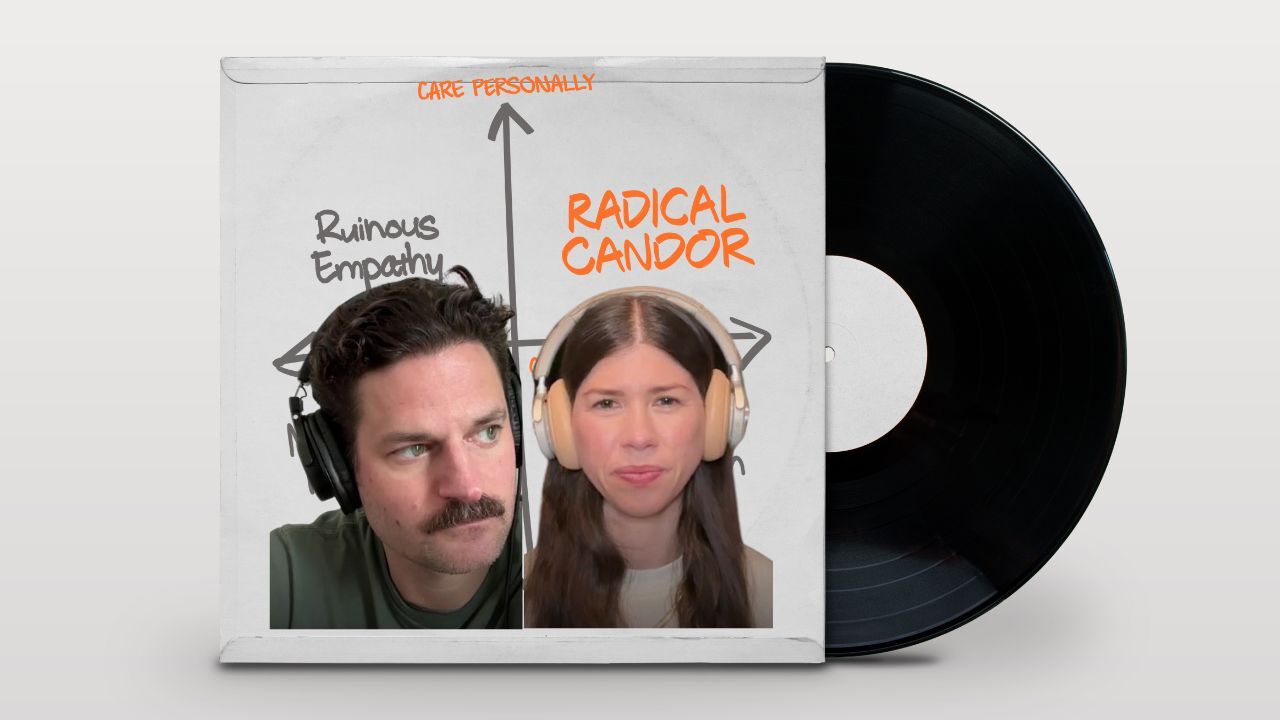Kim Scott & Dick Costolo Explore the Fallout of Poor Promotion Practices
Edited By Brandi Neal, Radical Candor podcast writer and producer, and director of content creation for Radical Candor. This article about how to...
4 min read
Radical Candor Sep 10, 2025 12:35:42 PM

Edited By Brandi Neal. When Chloé van Bergen joined Secretly Group in the middle of the pandemic, she faced legacy systems, cultural barriers, and the growing pains of a company on the rise. By embracing Radical Candor, the vice president of operations discovered how direct feedback and vulnerability could transform leadership—and reshape one of the most influential independent music companies.
van Bergen never expected a bachelor party to be the setting for a career-defining conversation. But that’s exactly where she met Nick Carissimi, Radical Candor podcast audio engineer—and shared her unexpected fandom for the book Radical Candor and its principles.
"I love that show. I’ve read the book. I’ve applied it at my job,” van Bergen told Carissimi over the din of a London pub, surrounded by music industry insiders. That serendipitous conversation eventually led to a deeper dialogue—one that would reveal how Radical Candor was helping shape culture, communication, and leadership at one of the most prominent independent music companies in the world.
Secretly Group, with its seven record labels, publishing and distribution arms, and investments ranging from a vinyl manufacturing plant to capital ventures, has nurtured artists like Bon Iver, Phoebe Bridgers, and Mitski. But beneath the prestige lies a culture of close collaboration—a culture van Bergen sought to evolve through clear, candid feedback.
Van Bergen credits her evolution as a leader to a pivotal mindset shift about feedback. “I was probably leaning too far into the shit sandwich,” she admitted. “I wasn’t really saying the thing I was trying to say because I wanted to make people feel good.”
Reading Radical Candor helped her recognize the cost of Ruinous Empathy—the desire to be nice at the expense of clarity. The book gave her permission to be direct, even if it felt awkward at first. “By not saying it, you're actually doing yourself and the other person a disservice,” she said. “It's okay if you're being obnoxious for a bit. Don’t stay there, but start.”
Feedback, van Bergen emphasized, is an investment in others. “If I open myself up, I think others will start to do the same,” she said, referencing the influence of Brené Brown’s work on vulnerability, which she was exploring at the same time.

At Secretly Group, Radical Candor had to be adapted across cultures. “In the UK, they love tiptoeing around the elephant,” van Bergen said. “It’s a lot harder to get real honest feedback.”
She recalled a moment when a North American HR colleague intervened in a conversation to say plainly, “I just want to make sure you understand that you are in hot water right now.” British managers found that bluntness jarring. But for van Bergen, who works across teams in Europe and the U.S., it underscored the need for shared language and expectations around feedback.
Her Dutch colleagues offered a stark contrast. “If what you're saying is you just like knowing where you stand,” she said, laughing. A grandmother’s blunt critique of her glasses—“I don’t like those on you. But of course it’s you who needs to like them.”—wasn’t meant to be hurtful, just honest.
Van Bergen joined Secretly Group during the pandemic, just as the company was poised for new commercial success. Tasked with scaling international operations, she faced legacy systems and a workforce hesitant to change.
“We had employees who’d been there 10-plus years,” she said. “If you're used to doing things a certain way, it's harder to accept change. And also, I was the new person.”
Initially, she tried diplomacy, but encountered resistance—and worse, indifference. “That's just so much worse,” she said. “If there's tension, there's an opportunity for change. If there's indifference, it's a momentum killer.”
Reflecting back, she wishes she’d pushed harder for open disagreement and solicited more feedback early on. “I probably could’ve gotten there a lot faster,” she said.
Urgency came when hiring ramped up and van Bergen saw that some teams weren’t built for scale. “We needed to make changes,” she said. “The jeopardy is just so much higher if we just kick the can down the road.”
The Radical Candor framework of “rockstar” versus “superstar” mode helped her shift how she thought about growth and performance. “I thought superstar mode was the ideal,” she said. “But there's real value to having people who are just awesome at the job and steady.”
During the pandemic, Secretly Group faced another seismic shift: a move toward unionization. The company learned about the effort the same day a Rolling Stone article went live. “It felt quite emotional,” van Bergen recalled. “Staff were saying they didn’t feel heard.”
With live shows and perks on hold, the day-to-day realities of low pay and unclear communication came into sharper relief. “We were committed to no layoffs, and perhaps as a result, we took the ball off of some other areas of the business,” she admitted.
Still, leadership recognized the union immediately and entered negotiations. “It was rough and thorny at times,” she said. “But I truly believe we’re a stronger company for it.”
One story stuck with her: an employee who worked overtime rather than ask for help, fearing micromanagement. “It really resounded that the employee doesn’t feel like they have an avenue to say, ‘Hey, you’re getting in my way,’” she said. “That led us to make sure people felt comfortable going to management.”
In an industry where “kindness” can be mistaken for “niceness,” van Bergen sees the danger in avoiding hard conversations. “Learning that kind is actually doing the hard thing, that’s been part of the Radical Candor journey,” she said.
Too often, the company tried to contort roles around long-time employees out of loyalty. “We were crafting bespoke positions to keep people on,” she said. But in doing so, the company delayed necessary change. “It was worse for them as well because they ended up in roles that didn’t quite make sense—even to themselves.”
She now understands that the kindest thing is often being honest. “Just say the thing,” she said. “Take away the emotion. Start now. It might not land. You'll recover, I promise.”
That message, stitched into a pillow by Kim Scott’s great-grandmother—“Say something. You can always take it back.”—could just as easily live on van Bergen’s desk.
If you understand the importance of receiving feedback in the workplace, then you need The Feedback Loop (think Groundhog Day meets The Office), a 5-episode workplace comedy series starring David Alan Grier that brings to life Radical Candor’s simple framework for navigating candid conversations.
You’ll get an hour of hilarious content about a team whose feedback fails are costing them business; improv-inspired exercises to teach everyone the skills they need to work better together; and after-episode action plans you can put into practice immediately to up your helpful feedback EQ.
We’re offering Radical Candor readers 10% off the self-paced e-course. Follow this link and enter the promo code FEEDBACK at checkout.

Edited By Brandi Neal, Radical Candor podcast writer and producer, and director of content creation for Radical Candor. This article about how to...

While the thought of giving or getting feedback might conjure up dread, or as one friend said to me when I told her where I worked, "Hearing the word...

Shortly after she published Radical Candor, Kim Scott realized that biased feedback and protective hesitation make giving and receiving guidance more...